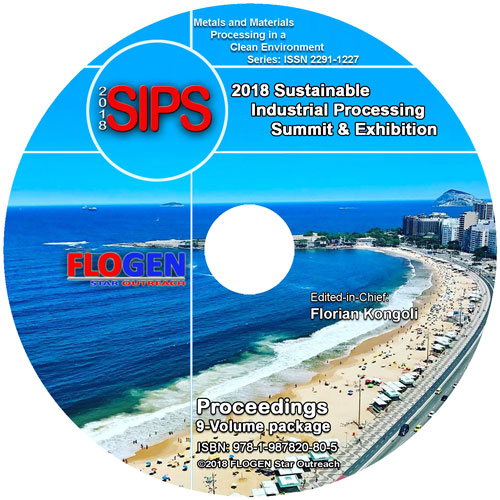2018-Sustainable Industrial Processing Summit
SIPS2018 Volume 2. Amatore Intl. Symp. / on Electrochemistry for Sustainable Development
| Editors: | F. Kongoli, H. Inufasa, M. G. Boutelle , R. Compton, J.-M. Dubois, F. Murad |
| Publisher: | Flogen Star OUTREACH |
| Publication Year: | 2018 |
| Pages: | 216 pages |
| ISBN: | 978-1-987820-84-3 |
| ISSN: | 2291-1227 (Metals and Materials Processing in a Clean Environment Series) |

CD shopping page
Membrane Electrolysis as a New Method for Lithium Recovery From Brines
Victoria Flexer1; Noelia Palacios1; Cesar Diaz Nieto2; Korneel Rabaey3;1CENTRO DE INVESTIGACIóN Y DESARROLLO EN MATERIALES AVANZADOS Y ALMACENAMIENTO DE ENERGÃA DE JUJUY-CIDMEJU, Palpalá, Argentina; 2CENTRO DE INVESTIGACION Y DESARROLLO EN MATERIALES AVANZADOS Y ALMACENAMIENTO DE ENERGIA DE JUJUY-CIDMEJU, Palpalá, Argentina; 3CMET, GHENT UNIVERSITY, Gent, Belgium;
Type of Paper: Regular
Id Paper: 250
Topic: 47
Abstract:
The electrification of our world, particularly road transportation and power storage, drives a strong increase in demand for lithium. The continued availability of lithium can only rely on a strong increase of mining and ore processing. It would be an inconsistency if the increased production of lithium salts for a more sustainable society would be associated with non-sustainable practices. Currently 2/3 of the world production of lithium is extracted from brines, a practice that evaporates half a million cubic metres of water per ton of lithium carbonate.
We will present an integrated membrane electrolysis concept to separate lithium from brines, driven by renewable power and delivering byproducts instead of waste. Our technology is based on a 4 stage process, each based on a water electrolyser with a side crystallizer. The chambers of the electrolysers are separated by anion and/or cation exchange membranes (AEM or CEM). At the anode, water will be oxidized to oxygen, and/or chloride to chlorine gas. In the cathode, water will be reduced to hydrogen, and the pH will increase. The applied potential and the need to maintain electroneutrality will make cations and anions selectively move to the cathodic or anionic compartments. By a careful pH adjustment with current flow, and selectively bubbling CO<sub>2</sub> at interval, it is possible to sequentially precipitate the different brine components, with Li<sub>2</sub>CO<sub>3</sub> precipitating last.
Our proposed technology is fast, not requiring time consuming evaporation. Because it is much less dependent on solution composition, it could render the exploitation of a large number of currently unexploited resources possible, including salar brines and geothermal waters in Europe. Moreover, this technology will be much easier to adapt to different brines, and pilot scale runs will be performed quickly, as opposed to sluggish optimization in the evaporitic technology.
Keywords:
Electrochemistry; Physical electrochemistry;References:
[1] Vikström, H., et al. Applied Energy, 2013. 110: 252-266[2] Talens Peiró, L., et al. JOM, 2013. 65(8): 986-996.
[3] Swain, B. Separation and Purification Technology, 2017. 172: 388-403.
[4] Flexer, V. et al., 2018, submitted for publication.